State-sponsored terrorism is terrorist violence carried out with the active support of national governments provided to violent non-state actors. States can sponsor terrorist groups in several ways, including but not limited to funding terrorist organizations, providing training, supplying weapons, providing other logistical and intelligence assistance, and hosting groups within their borders. Because of the pejorative nature of the word, the identification of particular examples are often subject to political dispute and different definitions of terrorism.

Active measures is a term used to describe political warfare conducted by the Soviet Union and the Russian Federation. The term, which dates back to the 1920s, includes operations such as espionage, propaganda, sabotage and assassination, based on foreign policy objectives of the Soviet and Russian governments. Active measures have continued to be used by the administration of Vladimir Putin.
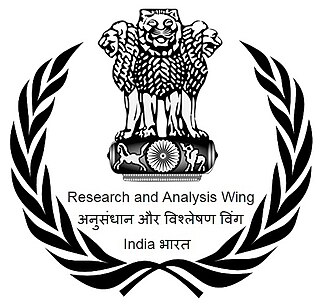
The Research and Analysis Wing (R&AW) is the foreign intelligence agency of India. The agency's primary function is gathering foreign intelligence, counter-terrorism, counter-proliferation, advising Indian policymakers, and advancing India's foreign strategic interests. It is also involved in the security of India's nuclear programme.
As early as the 1920s, the Soviet Union, through its GRU, OGPU, NKVD, and KGB intelligence agencies, used Russian and foreign-born nationals, as well as Communists of American origin, to perform espionage activities in the United States, forming various spy rings. Particularly during the 1940s, some of these espionage networks had contact with various U.S. government agencies. These Soviet espionage networks illegally transmitted confidential information to Moscow, such as information on the development of the atomic bomb. Soviet spies also participated in propaganda and disinformation operations, known as active measures, and attempted to sabotage diplomatic relationships between the U.S. and its allies.

Melita Stedman Norwood was a British civil servant, Communist Party of Great Britain member and KGB spy.

The Directorate General of Forces Intelligence, commonly known by its acronym DGFI, is the defense intelligence agency of the Bangladesh Armed Forces, tasked with collection, collation and evaluation of strategic and topographic information, primarily through human intelligence (HUMINT). As one of the principal members of the Bangladesh intelligence community, the DGFI reports to the Director-General under the executive authority of the head of government, the Prime Minister, and is primarily focused on providing intelligence for the Prime Minister, the Cabinet of Bangladesh, and the Armed Forces of Bangladesh.
The "Mitrokhin Archive" is a collection of notes and documents which were secretly made, smuggled, and hidden by the KGB archivist Vasili Mitrokhin during the thirty years in which he served as a KGB archivist in the foreign intelligence service and the First Chief Directorate. When he defected to the United Kingdom in 1992, he brought the archive with him, in six full trunks. His defection was not officially announced until 1999.
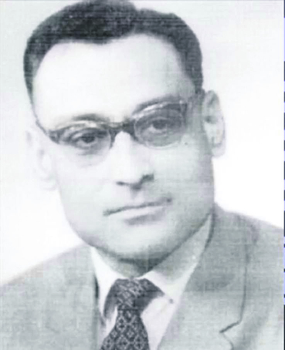
Rameshwar Nath Kao was an Indian spymaster and the first chief of India's external intelligence agency, the Research and Analysis Wing (R&AW) from its founding in 1968 to 1977. Kao was one of India's foremost intelligence officers, and helped build R&AW.
Ashok Chaturvedi, IPS was the chief of India's external intelligence agency the Research and Analysis Wing (R&AW) from 1 February 2007 to 31 January 2009. Chaturvedi succeeded P.K.H. Tharakan, a 1968 batch officer of the IPS Kerala cadre who retired on 31 January 2007.
Below is a list of speculated CIA activities in India.
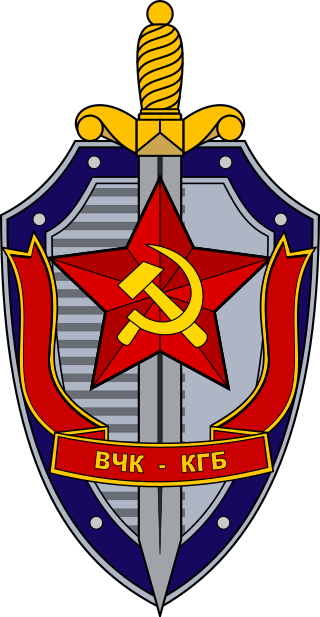
The Committee for State Security was the main security agency for the Soviet Union from 13 March 1954 until 3 December 1991. As a direct successor of preceding agencies such as the Cheka, GPU, OGPU, NKGB, NKVD and MGB, it was attached to the Council of Ministers. It was the chief government agency of "union-republican jurisdiction", carrying out internal security, foreign intelligence, counter-intelligence and secret police functions. Similar agencies operated in each of the republics of the Soviet Union aside from the Russian SFSR, where the KGB was headquartered, with many associated ministries, state committees and state commissions.
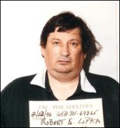
Robert Stephen Lipka was a former army clerk at the National Security Agency (NSA) who, in 1997, pleaded guilty to conspiracy to commit espionage and was sentenced to 18 years in prison. He was arrested more than 30 years after his betrayal, as there is no statute of limitations for espionage.
Russian espionage in the United States has occurred since at least the Cold War, and likely well before. According to the United States government, by 2007 it had reached Cold War levels.
Lieutenant General Asad Ahmed Durrani is a retired 3-star rank general in the Pakistan Army and presently a commentator, speaker and author. Durrani previously served as the Director General of the ISI and former Director General of the Pakistan Army's Military Intelligence.

Vikram Sood is the former head of India's foreign intelligence agency, the Research and Analysis Wing (R&AW), and an advisor to the Observer Research Foundation, an independent public policy think tank in New Delhi. Sood was an officer of the Indian Postal Service (IPoS) before he joined the intelligence organisation R&AW and later served as its spymaster from 2000 to 2003. He retired as a career intelligence officer with 31 years of service on 31 March 2003.

Amarjit Singh Dulat was a spymaster and a former special director of the Indian Intelligence Bureau and former Secretary of Research and Analysis Wing from 1999 to 2000. After retirement, he was appointed as an advisor on Jammu and Kashmir in the Prime Minister's Office and served there from January 2000 to May 2004.
Kulbhushan Sudhir Jadhav is an Indian national who has been incarcerated in Pakistan since 2016. The Pakistani government alleges that he is a spy for India's intelligence agency, the Research and Analysis Wing and was arrested in the Pakistani province of Balochistan. The Indian foreign ministry says that he was kidnapped from Iran and illegally rendered to Pakistan.

Romeo Akbar Walter is a 2019 Indian Hindi-language action thriller film written and directed by Robbie Grewal. It stars John Abraham, Mouni Roy, Jackie Shroff and Sikandar Kher. The narrative centers on a banker who is recruited as a spy for the Research and Analysis Wing for an undercover operation in Pakistan, where he faces both physical and emotional challenges. The film was inspired by the life of Indian spy Ravindra Kaushik and theatrically released on 5 April 2019.
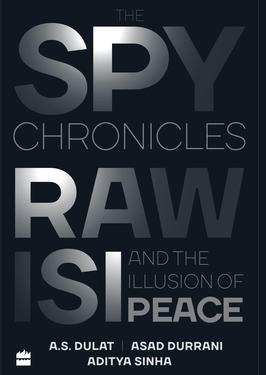
The Spy Chronicles: RAW, ISI and the Illusion of Peace is a 2018 book in the format of a dialogue between two intelligence chiefs of India and Pakistan, AS Dulat and Asad Durrani, and moderated by Aditya Sinha. The conversations between the two intelligence chiefs took place during 2016 and 2017 in Istanbul, Kathmandu and Bangkok. AS Dulat is a former head of India's external intelligence agency, the Research and Analysis Wing (R&AW), Lt. Gen. Asad Durrani is a former head of Pakistan's external agency, Inter-Services Intelligence (ISI), and Aditya Sinha is an Indian journalist.
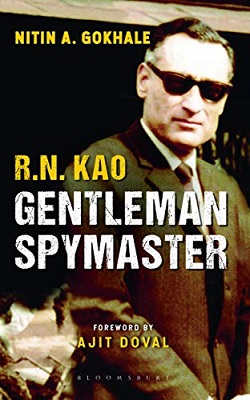
R.N. Kao: Gentleman Spymaster is a biography of Rameshwar Nath Kao, the founding chief of India's external intelligence agency, the Research and Analysis Wing (R&AW). Written by Nitin A. Gokhale, the book was published by Bloomsbury India in November 2019. The book is being adapted into a movie by Karan Johar.













